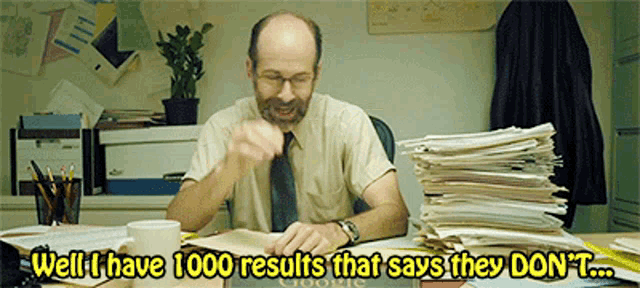- cross-posted to:
- [email protected]
- [email protected]
- cross-posted to:
- [email protected]
- [email protected]
More like sponsored ”Product” for the first 8 results
Whenever I have to brave the Google abyss, I usually use Startpage. Obviously uBlock Origin but if I can avoid being bombarded by devious and distracting ads altogether, I’d rather that.

Source?
If Google was a Guy. It is hilarious.
No, I want the 1000 results please. Not the video source, the link sources. All 1000 of em.
Youtube video “If Google Was A Guy”. I commented at the same time as the person above, nice.
True but I see this more as a critical thinking problem - which is pervasive in our society and worsened by the tech bubbles. People should want to seek out information that both argues for and against a topic.
The way our education systems work now, at least in the US, that method of thinking only begins around college and varies widely by academic pedigree.
Not critical thinking, but confirmation bias, yes.
If you google the right thing you’ll only get answers that agree with you.
This is why I only use Google Scholar and sort by number of references to that paper for fucking anything now. And even then, some garbage seems to slip through.
SEO has ruined indexers
Ad
Ad
Ad
Series of AI generated answers
Ad
Article from site you’ve never heard of that is filled with ads
Article from a local city you’ve never heard of
Article written by AI that contains 3 sentences and then ads
Ad
Actual good source article for different topic
Reddit post about topic
Wikipedia
Ad
Next page?
Because the font was so similar with “Ad” I was instinctively rolling my eyes and scrolling past your comment before I realized it was a comment LOL.
Effective!
This is why I use SearXNG; locally hosted on a container. It collates and sorts out the crap from all the engines at once. I get a useful list of results normally. My personal instance is configured to shotgun several engines at once and uses Wolfram Alpha or Wikipedia for informational boxes over other engines; if those services present a result.
My experience:
- Infobox (if applicable), Source is reliable; usually Wolfram Alpha or Wikipedia. May not always be immediately relevant but it’s usually a close enough match.
- Most relevant results (3 to 7 of them)
- Relevant results containing any terms (Many)
- Less relevant results (Usually on page 2 or 3 by this time)
- Nonsensical results; may be slightly relevant (Usually you’re 7 to 10 pages deep by then)
Thanks Googie
Everyone these days is in a bubble. All of the things they believe in echo around inside the bubble. The other side is evil. We can’t listen to them. They have alternate facts. The politicians feed this to rile up the faithful to get more votes. Who cares if people start killing each other and storming the capital as long as they can gain power and keep it so they can get rich sucking up to their corporate overlords.
It’s a cult tactic. You get your subjects to alienate themselves away from outsiders so that they further rely on the cult.
Absolutely and it’s scary AF.
Make a habit of reading takes (from reputable / serious sources) that you think you’ll disagree with.
Even if it doesn’t change your mind, you will understand other people’s POV. This is very important for understanding your own stance better and finding flaws and uncertainties in it.
It also tends to humanise “the other side” (whoever that is for you), which makes it easier to have a constructive argument rather than meaningless fights.
Now it’s all AI written. Top 15 hits be like:
"Many are wondering why PC LOAD LETTER is displayed on their printer, and they would be right to ask this, because printer errors can be frustrating.
First let’s start with the basics;
What is a printer?
Damn, it feels good to be a gangsta…"
“My great aunt sue once had a printer and oh man the things she’d print…”









